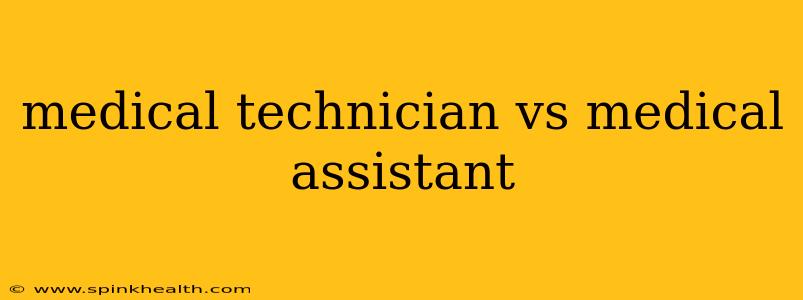Medical Technician vs. Medical Assistant: Unveiling the Differences
The healthcare field offers a plethora of career paths, and two often-confused roles are the medical technician and the medical assistant. While both contribute significantly to patient care, their responsibilities, training, and career trajectories differ considerably. Let's delve into the specifics to understand which path might be the right fit for you.
Imagine two individuals, Sarah and Emily, both working in a bustling clinic. Sarah, a certified medical technician, expertly operates sophisticated medical equipment, ensuring accurate diagnoses. Emily, a medical assistant, diligently manages patient records, schedules appointments, and assists the physician with examinations. Their roles, while both vital, are distinctly different.
What does a Medical Technician do?
Medical technicians are specialized healthcare professionals who operate and maintain sophisticated medical equipment, performing a variety of tests and procedures. Their expertise is crucial for accurate diagnoses and effective treatment plans. This role demands a strong understanding of medical science and technical skills.
Different Types of Medical Technicians:
Several specializations exist within the medical technician field, including:
- Phlebotomist: Draws blood samples from patients for laboratory analysis.
- Radiologic Technologist: Operates X-ray, CT, MRI, and other imaging equipment.
- Cardiovascular Technologist: Performs electrocardiograms (ECGs) and echocardiograms.
- Respiratory Therapist: Administers respiratory treatments and monitors patient lung function.
- Nuclear Medicine Technologist: Administers and monitors radioactive materials for diagnostic purposes.
Each specialization requires specific training and certification.
What does a Medical Assistant do?
Medical assistants are the versatile support staff within a medical practice. They handle a wide range of administrative and clinical tasks, acting as a vital link between the physician and the patient. Their responsibilities include:
- Administrative Tasks: Scheduling appointments, managing patient records, answering phones, billing and insurance processing.
- Clinical Tasks: Taking vital signs, assisting with examinations, preparing patients for procedures, administering injections (depending on certification and state regulations), and collecting specimens.
While they perform some clinical tasks, medical assistants generally don't operate sophisticated medical equipment independently like medical technicians.
What are the educational requirements?
Medical Technician: Medical technicians typically require an associate's degree or a certificate from an accredited program, followed by certification through a relevant professional organization. The specific educational requirements vary greatly depending on the specialization. For example, a radiologic technologist needs significantly more education than a phlebotomist.
Medical Assistant: Medical assistants usually complete a postsecondary certificate or associate's degree program in medical assisting. Certification, while not always mandatory, is highly recommended and can enhance career prospects. Many programs offer combined administrative and clinical training.
What is the job outlook?
Both professions offer promising job outlooks, with a projected growth expected in line with the overall growth of the healthcare industry. However, the specific demand varies based on location, specialization (for medical technicians), and the overall health of the economy.
How much do they earn?
Salaries for both medical technicians and medical assistants vary greatly depending on location, experience, specialization (for technicians), and employer. Generally, medical technicians tend to earn higher salaries than medical assistants due to their specialized training and responsibilities. However, both roles offer competitive compensation compared to other support staff roles within healthcare.
Medical Technician vs. Medical Assistant: Which is right for you?
Choosing between these two careers depends on your interests, skills, and aspirations. Do you thrive in a technical environment, working with advanced equipment and detailed procedures? A medical technician path might be ideal. Are you drawn to patient interaction and a diverse range of tasks, blending administrative and clinical duties? A medical assistant role could be a better fit.
Ultimately, careful consideration of your strengths and career goals is crucial in making the right decision. Researching specific specializations within medical technology, exploring educational pathways, and shadowing professionals in both fields will provide invaluable insights to help you make an informed choice.

